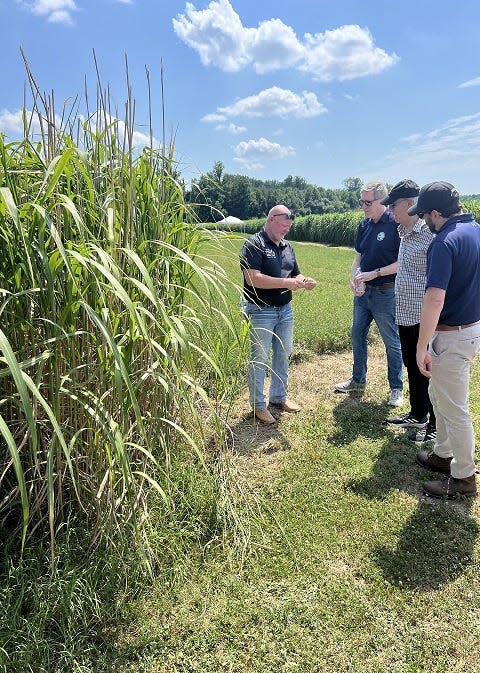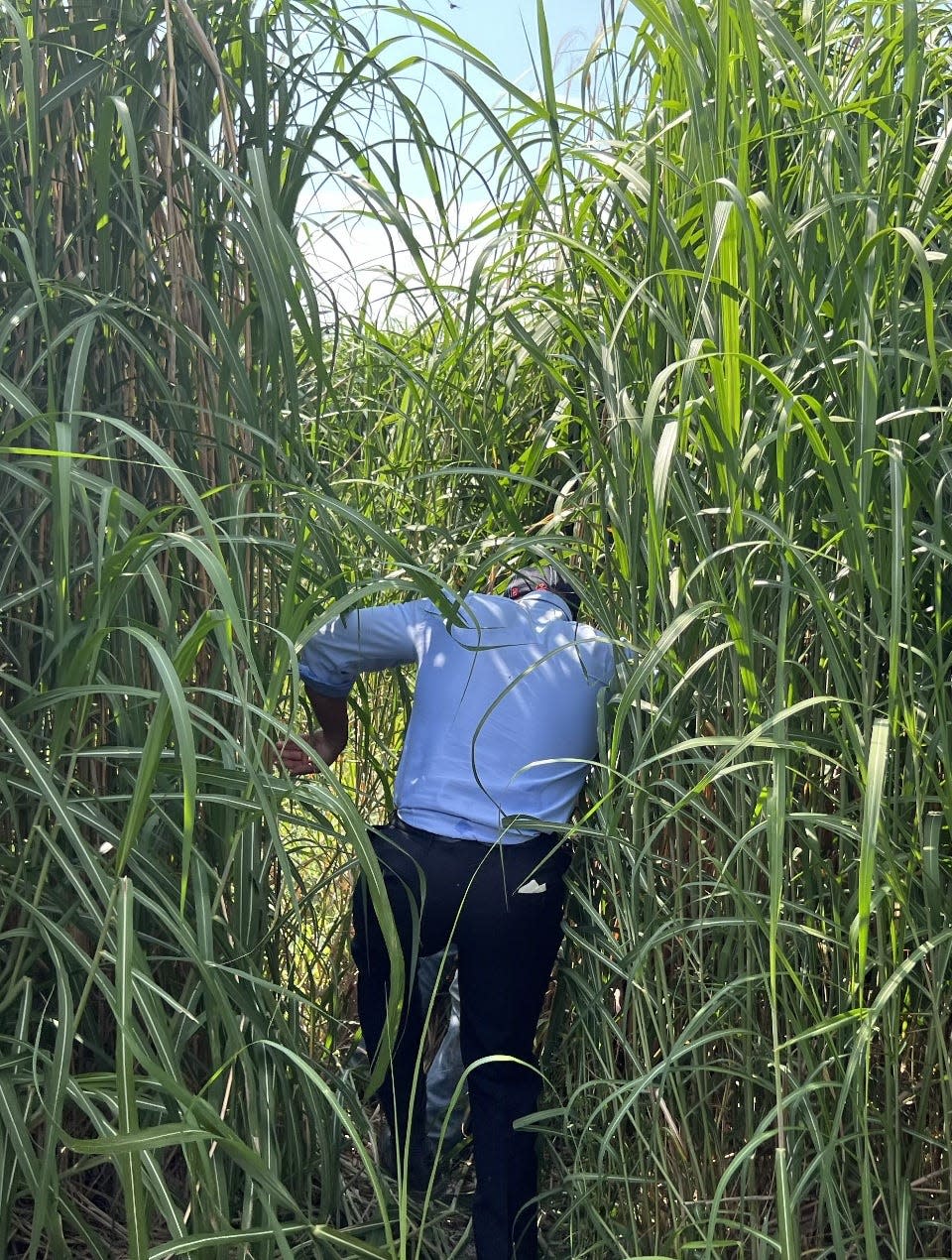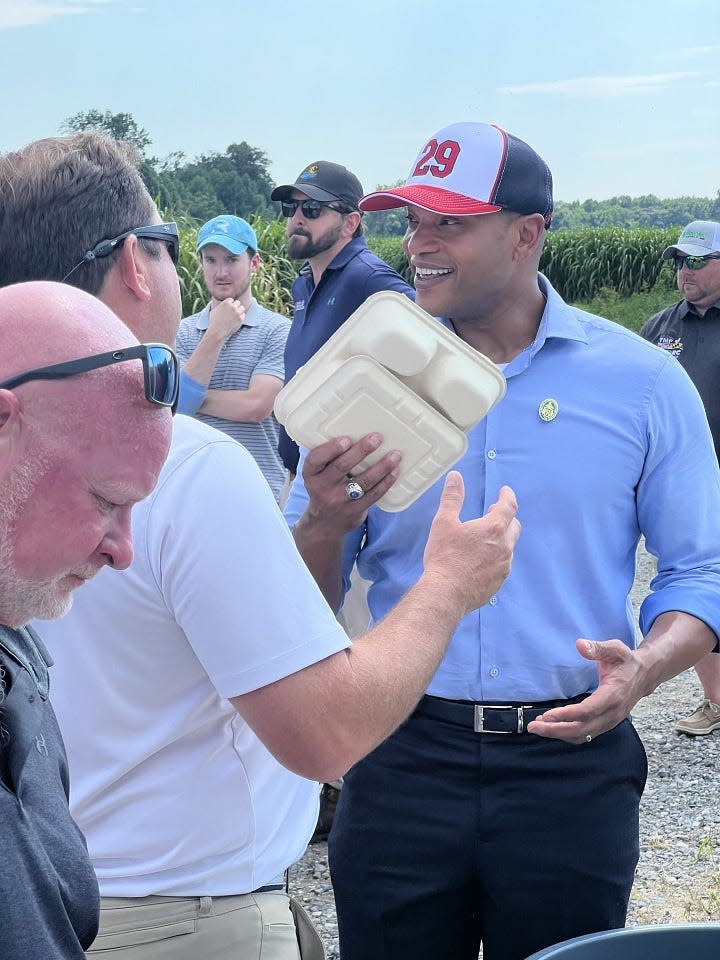For decades the farm was a cow pasture. Then it became a home for corn and other row crops. When Maryland’s governor visited Twin Maples Farm on the Eastern Shore this month, he was met (even enveloped) by something else: miscanthus.
Miscanthus grass, the Asian native over 10 feet tall with bamboo-like stems, has been growing on hundreds of acres of David Tribbett Jr.’s Caroline County farm for over a decade now.
When Tribbett first started growing the grass both as a vegetative buffer to maximize his farm’s space and to improve the performance in his chickenhouses, he was laughed at by others.
“It was just a crop that was not taken serious at first,” said Tribbett, in a June 18 phone interview. “Unless I grew it, I probably would’ve laughed at it myself.”
Now, in large part because of the grasses’ hardy stalk, he’s no longer the area’s laughingstock. Maryland Gov. Wes Moore, a Democrat, and multiple members of his cabinet toured the farm June 14 on an 89-degree Fahrenheit Friday afternoon to see firsthand the grass that contributes to one of the state’s, and the Shore’s, most important industries.
More: Inside the Maryland Department of Agriculture’s effort to cut red tape for farmers
‘What started with my own (chicken) houses’ performance grew…’
Waiting for the governor to arrive on the farm from a visit elsewhere in the county, Zach Evans, of the Delaware-headquartered Mountaire Farms, Inc., provided a primary purpose for the grass.
Over 70 percent of the company’s bedding needs for the birds are filled with miscanthus grass, said Evans, community relations manager for the fourth-largest chicken company in the country.
Tribbett says about five inches of the hard miscanthus stalk is laid on the floor of the houses in a year’s first months. He calls the pith that is in the inside of the stalk “kind of like kitty litter.”

“Originally, I got into (growing miscanthus) to improve my performance in my chickenhouses,” Tribbett said. “What started with my own houses’ performance grew into being able to supply Mountaire.”
And grow his miscanthus business has. Tribbett said he supplies about 1,000,000 to 1,500,000 cubic feet — about 500 tractor trailer loads — a year of the plant. A Mountaire site, with a grain elevator (purchased by the company in 2011), is a few miles away from Tribbett’s Ridgely, Maryland farm and the rocky road that leads down to the site of the governor’s Friday visit.
Mountaire’s Evans, an elected director of the Delmarva Chicken Association, said the company is aiming for miscanthus grass to supply 100 percent of the birds’ bedding needs in 2026. And a United States Department of Agriculture assessment document distributed by Evans on Friday indicated Delmarva’s 5,000-plus poultry houses require about 11,000,000 cubic feet of bedding.
More: How agritourism boosts Maryland farmers
‘The closed loop ecosystem’
Brian Smith, who works a farm six miles from Tribbett’s and directs Mountaire Farms “live operations,” told those on the governor’s tour that most of the sawmills in the area that used to provide the company’s bedding for the birds went out of business.
“We were having to import wood products from Pennsylvania,” Tribbett said. “That means there’s carbon emissions with that load coming down.”
Evans of Mountaire pitched the grass as “highly sustainable” during a meeting of the Maryland Agricultural Commission earlier in the week.

“Why we’re excited is, sort of, the closed loop ecosystem that exists,” Evans told his fellow commissioners at the Maryland Department of Agriculture’s Annapolis headquarters June 12.
In a June 18 interview, Tribbett noted Mountaire’s commitment and environmental “footprint.”
“The (miscanthus) leaf is what we use in our compost,” said Tribbett, adding that he receives Mountaire’s chicken manure, hatchery and grain waste for the miscanthus grass leaf compost.
At the start of the tour, with flies buzzing on the governor’s blue button-down shirt, Moore and Tribbett stood under a small tent on the sweltering hot day as Tribbett explained the compost process using buckets of the brown mixture.
The pair — Tribbett in blue jeans and brown boots and Moore in slacks and black dress shoes — then climbed down into a muddy pit to examine the below ground roots of the miscanthus plant.
Ocean City’s love locks: Ocean City’s love locks come down, upsetting locals and visitors alike
Moore: Agriculture ‘one of the most important industries’ for state’s future
After the two climbed back up, the governor held a sample container product made from the miscanthus.
Trailed by cabinet secretaries, including Secretary of the Maryland Department of Natural Resources Josh Kurtz and state Secretary of Agriculture Kevin Atticks, the pair walked down a path towards another tent, covering an area where miscanthus grass had been removed.
After a presentation featuring information from the USDA Agricultural Research Service, Tribbett pulled back the plant and took Moore into a narrow opening of the grass, so slim that the hand of the official state photographer of the governor could hardly follow.

In an interview a few minutes after the state’s chief executive emerged from the grass, he told a pair of reporters what he saw on the farm.
“What I’m seeing out here are some truly best practices in the way that we both protect farmland, grow farmland, and really celebrate an industry and a culture that’s incredibly important to our state,” Moore said.
He called agriculture “one of the most important industries in our state for the future,” adding “it’s an industry that continues to innovate.”

In an interview a few days after Moore left the farm, Twin Maples owner Tribbett was asked what he wanted people to know from the governor’s visit.
“Farmers are some of the smartest people,” he said. “It’s nice for us, as farmers, to be the lead on something that will environmentally impact.”
Dwight A. Weingarten is an investigative reporter, covering the Maryland State House and state issues. He can be reached at dweingarten@gannett.com or on Twitter at @DwightWeingart2.
This article originally appeared on Salisbury Daily Times: Farm on Maryland’s Eastern Shore visited by Moore, cabinet members
Signup bonus from





